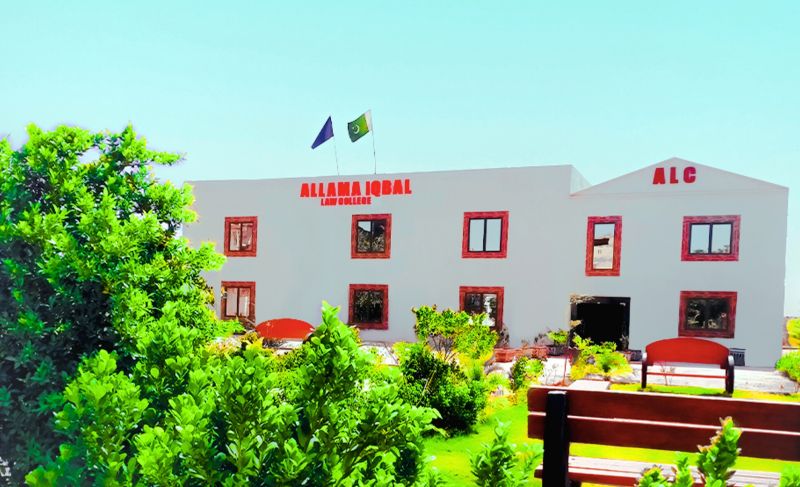Monday-Saturday: 9AM - 5PM
Monday-Saturday: 9AM - 5PM
Allama Iqbal Law College, strategically located on Lahore Road, Sargodha, is a premier institution renowned for its commitment to excellence in legal education. Affiliated with the prestigious University of the Punjab, Lahore, our college offers a comprehensive and rigorous 4-year LL.B (Bachelor of Laws) program. This program is meticulously designed to provide a strong foundation in law, equipping students with the theoretical knowledge and practical skills needed to excel in the dynamic field of legal practice.


Program Duration: 4 Years
Affiliation: University of the Punjab, Lahore
Eligibility Criteria: Intermediate (F.A/F.Sc/ICS/I.Com/A Level/3-Year Diploma) or an equivalent qualification with a minimum of 45% marks.
Our LL.B. programme is a blend of traditional legal education and modern pedagogical techniques, ensuring that students are well-prepared to meet the challenges of the legal profession. The curriculum covers a broad spectrum of legal subjects, enabling students to gain a comprehensive understanding of various branches of law.
Constitutional Law: Explore the principles and workings of constitutional governance and the rights of citizens.
Criminal Law: Study the legal framework governing crime, punishment, and the criminal justice system.
Civil Procedure Code (CPC): Understand the procedures followed in civil courts, including litigation processes.
Law of Contract: Learn about the formation, performance, and enforcement of contracts.
Law of Torts: Analyze civil wrongs and remedies available to individuals.
Company Law: Gain insights into corporate governance, the formation of companies, and corporate responsibilities.
International Law: Delve into the laws governing relations between states and international entities.
Legal Ethics: Develop a strong ethical foundation essential for legal practice.

To complement theoretical learning, our program places significant emphasis on practical training. Students are encouraged to participate in.
Moot Court Competitions: Simulated court proceedings to hone advocacy and legal argumentation skills.
Internship Programs: Mandatory internships with law firms, courts, and legal organizations to gain real-world experience.
Legal Research and Writing: Rigorous training in legal research methodologies and scholarly writing.
Court Visits: Regular visits to courts to observe live proceedings and understand the functioning of the judicial system.
Assessment and Evaluation: The LL.B program employs a continuous assessment approach, including written exams, oral presentations, moot court performances, and research assignments, ensuring that students are comprehensively evaluated on both their theoretical knowledge and practical skills.

The LL.B degree at Allama Iqbal Law College is more than an academic qualification—it is a gateway to understanding the complexities of the legal system and championing justice. Its impact reaches far beyond the courtroom, shaping society at every level.

Comprehensive Legal Knowledge: The LL.B curriculum covers all essential areas of law, providing students with a deep and nuanced understanding of legal principles.
Critical Thinking and Problem-Solving: The program is designed to enhance students’ analytical abilities, enabling them to think critically and solve complex legal issues.
Advocacy and Communication Skills: Through moot courts and debates, students develop strong oral and written communication skills, essential for effective legal practice.
Ethical and Professional Responsibility: The LL.B program instills a strong sense of ethical responsibility, preparing students to uphold the integrity of the legal profession.
Foundation for Further Studies: The LL.B serves as a stepping stone for advanced legal studies, such as LL.M (Master of Laws), Ph.D. in Law, or specialization in areas like international law, human rights, or corporate law.
Career Opportunities with an LL.B Degree
An LL.B degree from Allama Iqbal Law College opens the door to a wide range of career paths, each offering unique challenges and rewards. Our graduates are equipped to excel in diverse sectors, applying their legal knowledge and skills to make a lasting impact.
Advocate: Represent clients in civil and criminal cases, offering legal counsel and courtroom advocacy.
Corporate Lawyer: Advise businesses on mergers, acquisitions, contracts, and compliance.
Public Prosecutor: Serve the state by prosecuting criminal cases and upholding justice.
Legal Consultant: Provide specialized advice to individuals, corporations, and government bodies.
Criminal Lawyer: Defend or prosecute in criminal cases, ensuring fair application of the law.
Civil Judge: Resolve civil disputes and ensure justice through impartial judgments.
Magistrate: Preside over minor criminal cases, preliminary hearings, and judicial proceedings.
Legal Advisor: Guide corporations on regulatory compliance and contractual matters.
Compliance Officer: Ensure adherence to corporate policies, laws, and ethical standards.
Law Professor: Educate and mentor the next generation of legal professionals.
Legal Researcher: Contribute to legal scholarship, theory, and policy development.
Government Legal Advisor: Counsel government departments on legal matters and policy.
Human Rights Advocate: Work with NGOs or international organizations to protect fundamental rights.
NGO Legal Consultant: Support non-governmental organizations in advancing social justice causes.
Legal Officer (UN): Address global legal issues and contribute to international peace and security.
International Human Rights Advocate: Influence global policies and protect human rights on an international stage.
The legal profession is dynamic, offering continuous opportunities for growth and advancement. After completing an LL.B, graduates can explore various pathways to further their careers, whether through specialization, higher education, or professional development.
Advanced Specialization:
Pursue an LL.M in specialized fields such as Intellectual Property Law, Environmental Law, or International Trade Law to deepen your expertise and enhance your career prospects.
Professional Certifications:
Obtain certifications in niche areas of law, such as arbitration, mediation, or corporate governance, to diversify your skill set.
Higher Education:
Consider enrolling in a Ph.D. program in law to contribute to academic research and take up a career in academia or legal consultancy.
Judicial Exams:
Prepare for and pass the judiciary exam to join the esteemed ranks of judges and magistrates.
Networking and Professional Development:
Engage with bar associations, legal forums, and international legal networks to build connections and stay updated on the latest legal trends and developments.
Leadership Roles:
With experience, lawyers can ascend to senior positions such as partner in a law firm, head of a legal department, or senior counsel in a corporation or government body.
At Allama Iqbal Law College, we are dedicated to supporting our students throughout their educational journey, providing them with the resources, mentorship, and guidance necessary to achieve their career aspirations and make a significant impact in the legal profession.